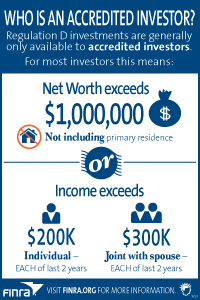Private Placements are considered alternative investments and are issued under Regulation D under the Securities Act of 1933. Regulation D contains rules for issuing securities that provide exemptions from the more rigorous Securities and Exchange Commission (SEC) registration requirements and allows companies to issue securities without normal disclosures.
Investors who are recommended private placements must meet the “accredited investor” standard under Rule 501. Rule 501 defines “accredited investor” as any person who has a net worth in excess of $1,000,000, excluding residence, or annual income in excess of $200,000, $300,000 if filing jointly with a spouse, in the two most recent years.
According to a 2008 estimate, companies issued approximately $609 billion of securities through Regulation D offerings. While the private placement market allows many small companies to raise capital, regulators have raised a number of issues with due diligence procedures and brokerage firm sales efforts when selling private placements to investors. The North American Securities Administrators Association says private placements are one of the most common cause of regulatory action by state regulators. States brought more than 200 enforcement actions involving private placements in 2011, more than doubled the number of action in2007.
 Securities Lawyers Blog
Securities Lawyers Blog



